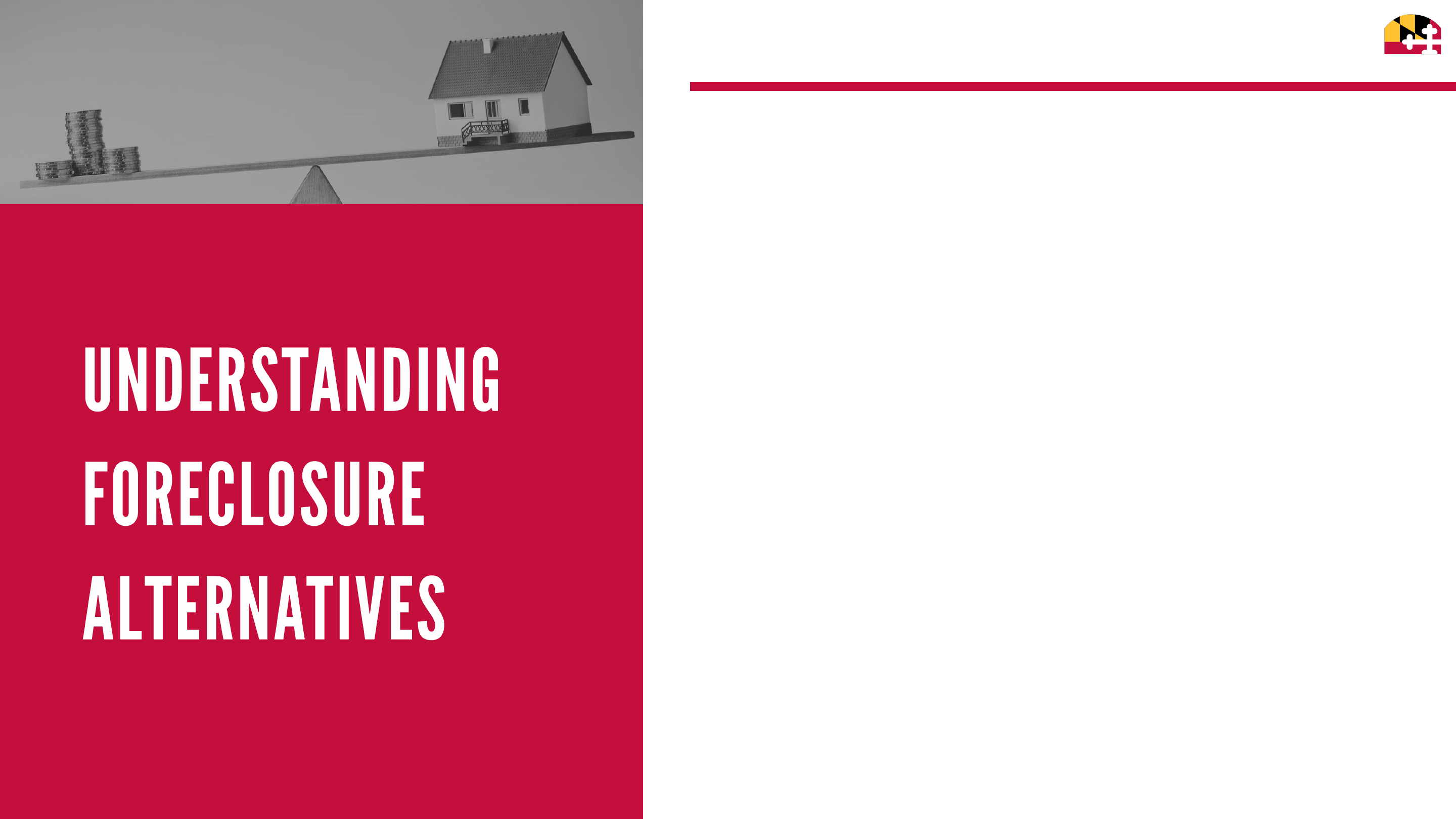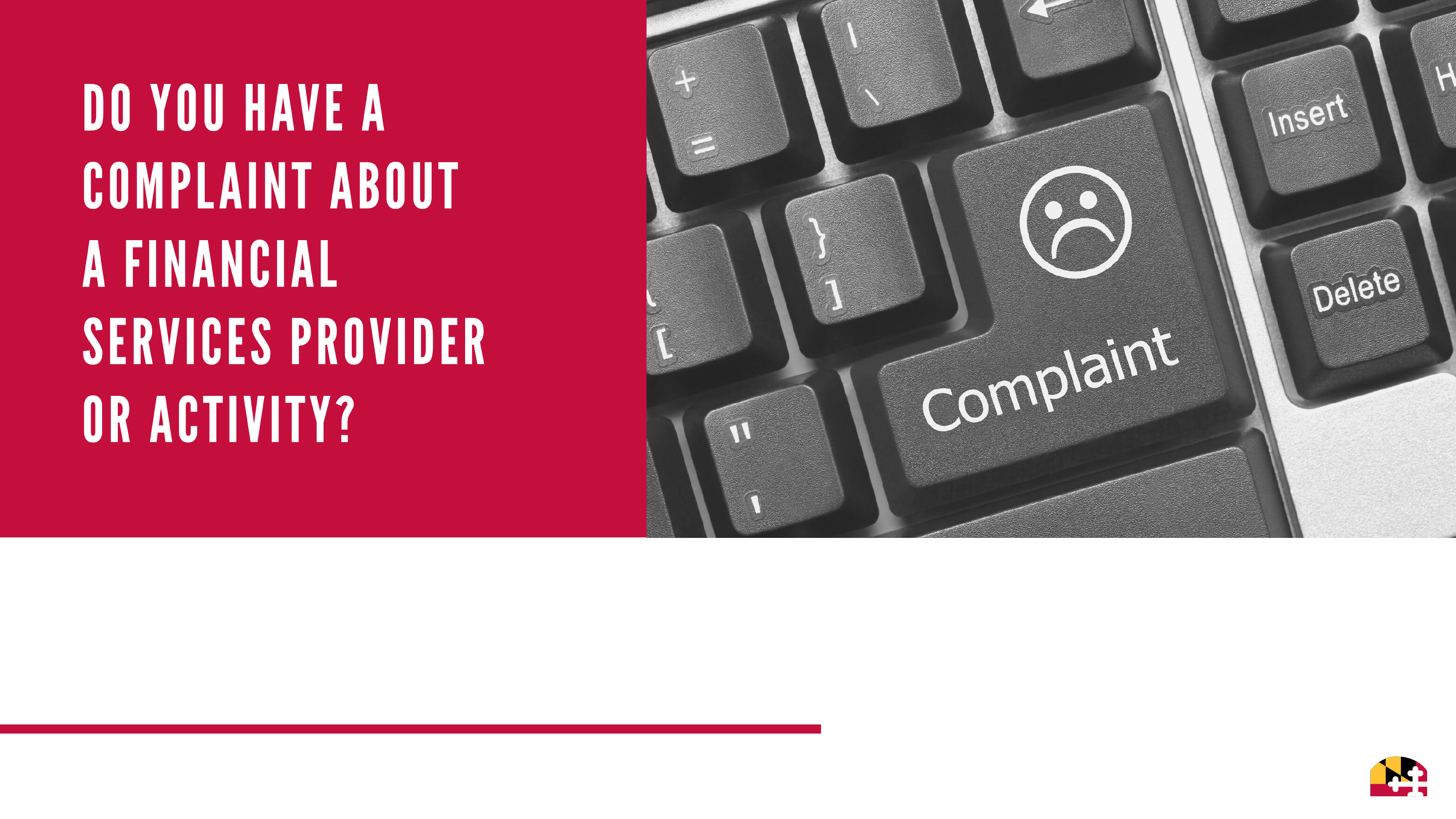
This presentation does not provide legal advice. You should
discuss specific questions with your trusted financial
advisor or insurance producer.

What is the Maryland Insurance Administration
The Maryland Insurance Administration (MIA) is the
state agency that regulates insurance in Maryland. The
MIA:
Licenses insurers and insurance producers (agents or
brokers).
Examines the business practices of licensees to ensure
compliance.
Monitors solvency of insurers.
Reviews/approves insurance policy forms. Reviews
insurance rates to ensure rates are not inadequate,
excessive or unfairly discriminatory.
Investigates consumer and provider complaints and
allegations of fraud.
Video: How the MIA can help

What is the Maryland Insurance Administration?
If you feel that your insurer or insurance producer acted improperly, you have
the right to file a complaint. Examples of improper actions include:
• Improperly denying or delaying payment of all or portions of a claim;
• Improperly terminating your insurance policy;
• Raising your insurance premiums without proper notice;
• Making false statements to you in connection with the sale of insurance or
processing of insurance claims; and,
• Overcharging you for services, including premium finance charges.

As a homeowner, we know that our mortgage company required us to obtain a homeowners policy of
insurance. Your mortgage company had an insurable interest in your home and the homeowners
policy protected both yours and the mortgage company’s investment. In the event the house was
damaged by a covered peril, the insurance policy will pay to restore the property to its full value in
most instances.
We sometimes hear from seniors who have dropped their homeowners insurance because they no
longer have a mortgage and don’t see the need to insure their home. They explain that the money they
save is needed for other expenses.
5
The Importance of Homeowners
Insurance

Ask yourself, if you suffered a loss to your home, would you be able to pay to rebuild or even
repair?
We often think of insurance to pay to rebuild after a fire. Think about a smaller loss such
as a burst pipe or roof damage caused by wind and how much this expenses would cost you
without a homeowners policy in effect.
Would you have the money to repair your home if those losses are in the tens of thousands of
dollars?
What would you do and where would you go if tomorrow your home was uninhabitable due to a
loss?
6
The Importance of Homeowners
Insurance

• Paying off your mortgage is an exciting event, but it comes with new
responsibilities.
• When you first purchased your home your lender likely required you to pay extra
money each month to an escrow account – to pay for expenses such as your
homeowners insurance.
• As the sole owner of your property now - you are now on your own to cover the
cost of homeowners insurance.
7
You’ve Paid Off Your Mortgage!

• Your lender had the right to take possession of your property if you
failed to make your mortgage payments.
• Homeowners insurance protected the lender’s financial interest in
your property.
8
Why Did My Lender Require Homeowners
Insurance?

• While maintaining Homeowners insurance after you’ve paid off your home is not
state or federally mandated, it is something you need to think carefully about before
you cancel your insurance.
• Your home is likely your largest asset.
• Homeowners insurance is there to pay for damages covered under the policy.
• Most people do not think about Homeowners insurance until they have a
reason to use it.
• Although we know that fires, theft, and other accidents occur, we tend to think,
“Odds are, that will never happen to me.”
• Unfortunately, if you experience a loss and you don’t have insurance, your
finances may be ruined.
9
Why Do I Need Homeowners Insurance
Now That I’ve Paid Off My Mortgage?

• Homeowners insurance policies protect more than just the
structure of you home.
• Common coverages found in a Homeowners policy include:
• Dwelling: This is the coverage that protects your home for
loss caused by things like fire, wind, hail, vandalism, and many
other perils. Not all perils are covered. For example, most
Homeowners policies do not cover flood losses; you may want
to purchase a separate flood insurance policy.
• Other Structures: This is the coverage that protects other
structures on your property that are not attached to the main
dwelling, like a garage, shed or other out building.
10
What Does Homeowners Insurance
Cover?

What does Homeowners Insurance
cover?
• Personal Property: This coverage protects the contents of your home if they
are damaged by a covered peril, including loss by theft.
• Loss of Use: This coverage will reimburse you for the increase in your living
expenses, including the cost of alternate housing, if your home is
uninhabitable as a result of a covered claim. Your policy will provide up to 12
months of coverage but is limited to the reasonable period of time needed to
complete the repairs.
11

What does Homeowners Insurance
cover?
• Liability: This coverage protects you in the event you or a member of your family are
legally responsible for an injury to another person or cause damage to another
person’s property.
• Your Homeowners policy may provide that liability coverage in the policy is not
limited to events that occur at your home; it may also provide protection to you
and your family for claims against you due to your activities away from home.
• Medical payments: This coverage provides up to a specific benefit amount for
medical expenses incurred by people injured in an accident in your home regardless
of fault (does not apply to you or
members of your household).
12

• Trees, Shrubs and Plants: Provides limited protection against damage to
greenery on property, but only for certain types of losses.
• Debris Removal: Pays a limited amount to remove debris from damaged
property if the damage that caused the debris is covered by your policy. Your
policy may also pay to remove fallen trees that cause damage to your property,
generally subject to a dollar limitation.
• Mold Coverage: May be covered if the mold arises out of a covered loss. Even
if covered, mold damage may be limited to a specific maximum amount.
13
What does Homeowners Insurance
cover?

Shopping for Homeowners Insurance:
Where Do I Start?
• Contact your Homeowners insurance company or your insurance producer!
• It’s important that you provide the documentation they need to remove your
lender from your insurance policy.
• Your lender is a named policyholder on your contract; and thus, the lender
would be entitled to payment if you filed a Homeowners insurance claim.
• If your mortgage is satisfied, this money would eventually find its way to
you.
• Having the lender’s name removed from your policy in advance can save you
frustration and delays.
14

Shopping for Homeowners Insurance:
How Much Homeowners Insurance Do I Need?
• Homeowners insurance companies use a calculator based on factors like
the age of your home, square footage, and building materials to calculate
the replacement cost of your home…but there are still things for you to
consider.
• Your dwelling coverage limit should be sufficient to rebuild your home
from the foundation up in the event of a total loss.
• How much liability coverage do you want? Consider your assets and talk
to a financial advisor if you need to.
15

• Do you have valuable personal property that needs to be scheduled,
such as jewelry, furs, or coins?
• You should speak with your insurance company about scheduling those
valuables separately.
• What deductible can you afford?
• The higher your deductible the lower your premium, but make sure
you have enough money in emergency savings to cover the deductible
in the event of a claim.
• Some policies have a separate deductible for wind, hurricanes and
other storms, so be sure to ask about that.
16
Shopping for Homeowners Insurance:
How Much Homeowners Insurance Do I Need?

Shopping for Homeowners Insurance:
Other Shopping Tips
• Be sure to understand the difference between actual cash value
(“ACV”) and replacement cost value (“RCV”) coverage on your
personal belongings.
• Actual cash value coverage will pay you the value of your items after
depreciation, but replacement cost value coverage will give you full
replacement cost of your items, without depreciation after you have
repaired or replaced the damaged item(s).
• Ask about water backup coverage for water that backs up through
sewers and drains.
• This is a common Homeowners insurance claim that can
cost tens of thousands of dollars to clean up after.
17

Shopping for Homeowners Insurance:
Other Shopping Tips
• If you are planning on long vacations, or you have a second home where
you spend time – look for language in the policy about vacant or
unoccupied property, and talk to your insurance agent about your
specific situation.
• Remember to read your policy, and ask questions if you need to! It could
save you a lot of heartache in the future.
18

Shopping for Homeowners Insurance:
Other Shopping Tips
• Maintain an inventory of all your possessions and regularly update it.
• Photograph and/or videotape each room and the exterior of your home.
• Write down all the major items you own along with relevant information
about them, such as the model and the serial number.
• Attach sales receipts when available.
• Safeguard these records – store them safely somewhere outside your
home, such as a safe deposit box.
19

Shopping for Homeowners Insurance:
What Else Do I Need To Know?
• Consider paying your insurance premium by automatic deduction
from your bank account. Some insurers offer a discount for this option
and this can save potential disruptions if you choose to take a long trip or
end up hospitalized for a period of time.
• Ask your current insurance company if you qualify for discounts like
safety and security devices, multi-policy, or other available discounts.
20

Shopping for Homeowners Insurance:
What Else Do I Need To Know?
Shop around!
• You may be surprised at how much less you can pay with
another company for the exact same coverage.
• Don’t forget – you want an apples to apples comparison,
make sure the quotes you get are for the same coverage.
21

Shopping for Homeowners Insurance:
What Do I Need to Know?
• Don’t forget to ask about riders for earthquake and other optional
coverage.
• Consider Purchasing Flood Insurance:
• You can learn about the risk to your own property at the National Flood
Insurance Program (NFIP) website: www.floodsmart.gov or call 888-379-
9531. Talk to your agent or contact the NFIP directly.
• Your home does not need to be located in a high-risk flood zone to be
eligible for coverage. A high percentage of flood claims occur outside of
designated high-risk flood zones.
• Flood insurance protects against damages cause by surface
flooding, with limited coverage for damage in basements.
22

Lenders can “Force-place” property insurance
coverage
If you finance the purchase of your home, your lender may require you to
carry fire insurance on that property. If you do not purchase the
insurance, your lender may force place coverage on you. The lender
obtains insurance on the property and requires you to reimburse them
for the cost of premiums paid. Forced-placed property insurance
coverage generally protects only the interest of the lender and not you,
the property owner.

If you have problems obtaining a homeowners
insurance policy
If you have been turned down by one insurer for homeowners insurance, try
obtaining coverage through another insurer or other insurers. Do not assume that
you will be turned down by all insurers. Just as insurers have different premiums,
they also have different underwriting requirements. Call around and keep trying to
obtain an insurance policy.
If you are unable to obtain insurance for your home from a private insurer, limited
insurance protection may be available through the Maryland Property Insurance
Availability Program, known as the:
Joint Insurance Association (JIA)
3290 North Ridge Rd Suite 210
Ellicott City MD 21043
410-539-6808 800-492-5670 www.mdjia.org

In Conclusion…
You may not like paying for insurance – but the consequences of not having it
can be devastating.
You could quickly erase the good decisions you’ve made in the past, and
eliminate the benefits from the hard work you put in while paying off your
home.
We hope and encourage you to think about the possible consequences of
potential catastrophic losses that could severely affect your overall finances
before you decide to cancel your homeowners insurance.
25

Contact Us
We’re here to assist with all of your insurance questions or issues.
Contact us to verify the insurer or insurance producer you select is
authorized to sell insurance in Maryland to protect yourself from fraud.
Maryland Insurance Administration
410-468-2000
800-492-6116
www.insurance.maryland.gov

Office of the Commissioner of Financial Regulation,
Maryland Department of Labor
Meredith Merchant, Director of Outreach and Education
April 28, 2021

The views expressed in this presentation are those of the
presenter(s) alone and do not necessarily reflect the position of
the Commissioner of Financial Regulation or the Secretary of
the Maryland Department of Labor.
This presentation contains general information only, and is not
legal or financial advice.
Office of the Commissioner of Financial Regulation - Maryland Department of Labor

TODAY'S
HIGHLIGHTS
• About Our Office
• Foreclosure
• Reverse Mortgages
• COVID-19 Financial Relief
• Contact Us

CHARTER, LICENSE, REGISTER
Responsible for chartering, licensing and
registering certain individuals and businesses
providing financial services to Maryland consumers.
EXAMINE, INVESTIGATE, SUPERVISE
Conducts periodic examinations and investigations
to ensure compliance with state and federal laws
and regulations, including investigating consumer
complaints.
The Office of the Commissioner of
Financial Regulation is Maryland’s
consumer financial protection agency
and financial services regulator.
Office of the Commissioner of
Financial Regulation, MD LABOR

CHARTERED, LICENSED OR
REGISTERED BUSINESSES
• Maryland-chartered banks and credit unions
• Mortgage lenders, servicers, brokers
• Mortgage loan originators
• Check cashers and money transmitters
• Collection agencies
• Consumer and installment lenders
• Consumer credit reporting agencies
• Debt management and credit services
• Sales financing companies ... and others
ADDITIONAL AUTHORITIES
• Student Loan Ombudsman
• Foreclosure relief and loss mitigation fraud
Office of the Commissioner of
Financial Regulation, MD LABOR

WHAT IS FORECLOSURE?
• Foreclosure is the legal process in
which a lender files a case seeking
authority to sell the mortgaged
property, in order to generate funds to
repay the amount owed on a defaulted
loan.
• A mortgage default is often due to
missed payments, but could be any
violation of the terms of the mortgage
document.
• Foreclosure process varies by state.
Office of the Commissioner of
Financial Regulation, MD LABOR

NOTICE OF
INTENT (NOI)
Warning notice that
mortgage is in default
and foreclosure
action could be filed;
mailed to borrower
from the lender or
their representative
FORECLOSURE
ACTION
"Order to Docket" -
court filing stating
that lender is
pursuing foreclosure
against borrower;
served on borrower
(45+ days after NOI)
MEDIATION
(IF ELIGIBLE)
Eligible owner-
occupant may
request mediation
hearing; helpful if
dispute between
parties re: loss
mitigation
FORECLOSURE
SALE
Lender or their
representative sells
property; if still in the
home, an owner-
occupant may be
evicted 30-45+ days
after sale
This is a SUMMARY of the mortgage foreclosure process for residential properties in Maryland. This graphic is
not a depiction of the full and complete foreclosure process. Some information has been removed for simplicity.
Office of the Commissioner of
Financial Regulation, MD LABOR

FORECLOSURE ALTERNATIVES
Your "loss mitigation" options will vary - ask lender
• Reinstatement
• Forbearance or deferment
• Loan Modification
• Pre-foreclosure sale
• Deed-in-lieu… and other options possible
FORECLOSURE RELIEF SCAMS
Typical warning signs of foreclosure scams:
• Unsolicited offer guaranteeing loan modification
or other mortgage assistance relief
• Requiring you pay an upfront fee before service
• Requiring you to make payments to a third party
instead of the lender or mortgage company
Office of the Commissioner of
Financial Regulation, MD LABOR
MD HOPE HOTLINE
1-877-462-7555
referrals for housing
counseling help

Office of the Commissioner of
Financial Regulation, MD LABOR
WHAT IS A REVERSE
MORTGAGE?
• A reverse mortgage allows older
homeowners to borrow money against
the equity in their home.
• The lender disburses payments to the
homeowner. Depending on the payout
structure, the interest rate can be
adjustable or fixed. There are closing
costs and fees.
• To be eligible, the primary borrower must
be at least 62 years old, the home must
be their primary residence, and there
must be sufficient equity in the home.

Office of the Commissioner of
Financial Regulation, MD LABOR
WHEN DOES THE LOAN BECOME DUE?
• Death of borrower - surviving spouse may remain
if certain criteria is met; must notify lender
• Occupancy - when home is no longer the primary
residence of borrower
• Unpaid taxes and insurance - if property taxes and
homeowners insurance are not paid
• Deferred maintenance - if home is not maintained
HOUSING COUNSELING IS REQUIRED
• Completion of homeowner education from certified
housing counselor is required prior to getting a
reverse mortgage (Maryland law)
• Contact U.S. Dept. of Housing and Urban
Development to find a reverse mortgage housing
counselor: 1-800-569-4287

Prohibition on new foreclosures until May 4
through June 30, 2021 – borrowers should not
receive "notice of intent"
MORTGAGE RELIEF
Payment forbearance for federally-backed
mortgages, must request before June 30, 2021
FORECLOSURE MORATORIUM
MORE COVID-19 FINANCIAL RELIEF
INFORMATION ON OUR WEBSITE:
www.labor.maryland.gov/finance/consumers/frcovid.shtml
Office of the Commissioner of
Financial Regulation, MD LABOR

PLEASE VISIT OUR WEBSITE AT WWW.LABOR.MARYLAND.GOV/FINANCE
OR EMAIL DLFRCOMPLAINTS-LABOR@MARYLAND.GOV.
Office of the Commissioner of
Financial Regulation, MD LABOR

OFFICE ADDRESS
500 N. Calvert Street, Suite 402
Baltimore, MD 21202
PHONE NUMBER
(410) 230-6100
E-MAIL ADDRESS
DLFRFinReg-LABOR@maryland.gov
WEBSITE
www.labor.maryland.gov/finance
Office of the
Commissioner of
Financial
Regulation

Information Session
Maryland Senator Edward J. Kasemeyer Prepaid College Trust
Maryland Senator Edward J. Kasemeyer College Investment Plan

Why Save
for College?

Maryland 529 Overview
* There may be tax implications for Maryland taxpayers that take a distribution for the education loan of a sibling of the beneficiary.
Check with your tax professional.
An independent, non-profit Maryland State Agency, overseen by a 11-member Board , that offers
two 529 college savings plans to help families prepare for the future cost of education and reduce
potential debt.
Maryland Prepaid
College Trust (MPCT)
Contract plan that allows
you to prepay college tuition
managed by the State of
Maryland
Maryland College
Investment Plan (MCIP)
Broad range of investment
options managed by T. Rowe
Price, an investment leader with
more than 80 years of
experience
BOTH PLANS
• Offer the “Save here, Go anywhere” benefit. Savings can be applied to any U.S. college,
even international universities that have a federal school code.
• Offer State and federal tax incentives:
o Any investment growth is tax-deferred at the State and federal level
o Earnings are Maryland and federal tax-free* when funds are used for eligible qualified
education expenses

QUESTION:
How does each Plan work?

Maryland Prepaid College Trust
(MPCT)
The freedom to secure tomorrow’s college tuition
based on today’s prices.
• Start with as little as a one
semester plan.
• Your benefits can be used both
in or out of State.
• Your payments may be eligible
for a Maryland State income tax
deduction of up to $2,500 per
year, per Account.
• It’s backed by a Maryland
Legislative Guarantee.

MPCT Benefits
Full MPCT benefits generally pay for Tuition and mandatory fees for
the tuition plan that you purchased, provided:
• the Beneficiary enrolls in college as a half-time or full-time student;
• at least 3 years have passed since you purchased your MPCT contract; and
• all payments have been satisfied.
Covered Expenses:
• If your Beneficiary attends a Maryland Public College, the MPCT will pay the full
in-state or in-county Tuition and mandatory fees at that college.
• If your Beneficiary attends an eligible private or out-of-state college, the MPCT
will pay the actual Tuition each semester (or the equivalent) up to a maximum of
one half of the Weighted Average Tuition in the tuition plan you purchased OR
your Minimum Benefit, whichever is greater. You would then have to make up any
difference.

Maryland College Investment Plan
(MCIP)
• $25 to open an Account
• Variety of Investment Options, managed by T.
Rowe Price
• No loads, sales charges, commissions,
enrollment fees, or annual account fees
• Your payments may be eligible for a Maryland
State income tax deduction of up to $2,500 per
year, per Beneficiary.
• Received Morningstar’s Silver rating
1
• Direct deposit from your bank account
or payroll (if offered by employer)
The freedom to choose how much and how often you want to invest
based on your budget and education savings goals.
1
See last page

MCIP
Eligible Educational Institutions:
• 4-year Colleges and Universities (In-State or Out-of-State)
• 2-year Community Colleges
• Trade or Technical Schools
• Certified Apprenticeship Programs - fees, books, supplies, and
equipment
• K-12* public, private, or religious school
– Limited to $10,000 per year, per Beneficiary for tuition
Covered Expenses:
• Any qualified education expense of the Beneficiary, outlined by the IRS
Publication 970. For higher education, generally includes tuition, room &
board, fees, books and supplies
*While distributions from 529 college savings plans for elementary or secondary education tuition expenses are federally tax-free, state tax treatment
will vary and could include state income taxes assessed, the recapture of previously deducted amounts from state taxes, and/or state-level penalties.
You should consult with a tax or legal professional for additional information.

QUESTION:
What are the State tax
benefits unique to
Maryland 529?

ANSWER: Maryland State Income Deduction
MPCT:
• Deduct up to $2,500 from your Maryland adjusted
gross income per Account each year.
• Payments in excess of $2,500 per Account can be
carried forward and deducted in future years until
the full amount has been deducted.
MCIP:
• Deduct up to $2,500 from your Maryland
adjusted gross income per Beneficiary each
year.
• Payments in excess of $2,500 per Beneficiary
can be carried forward and deducted for up to
the next 10 years.
Account Holders and Contributors are eligible for the Maryland income deduction on contributions they make.
If you received a Save4College State contribution in a given tax year however, you are not eligible to receive Maryland State income deductions
for contributions to any MCIP Account made in that same year.

QUESTION:
Are there age or
residency restrictions?
When can I open an
Account or enroll?

ANSWER: Age, Residency, and Enrollment
Vary by Plan
MPCT MCIP
Age
Open to 12th graders or younger,
including newborns
Open to adults or children of any
age, even before they are born
Residency
Either the Account Holder or child
must reside in Maryland or DC at the
time of enrollment
No Maryland or DC residency
requirements
Enrollment
Period
2020-2021 Enrollment Period:
December 1, 2020 – June 30, 2021
Enrollment open year-round if your child is
under age 1, or if you already have a Maryland
529 Account.
Enrollment open year-round
You may choose either plan – or both

QUESTION:
Would I lose my savings
if my student doesn’t
go to college or gets
a scholarship?

ANSWER: You have options.
MPCT
• Apply to cover other eligible expenses
– books, room & board
• Defer use until graduate school
• Transfer Unused Benefits to a relative of
the beneficiary (by blood or marriage)
• Transfer to MCIP
• Request a Refund*
MCIP
• Apply to cover other eligible expenses
– books, room & board
• Defer use until graduate school
• Transfer to a relative of the beneficiary
(by blood or marriage), including
yourself
• Take a Distribution*
*There may be federal and/or state tax effects. Please consult with your tax professional before taking a distribution or receiving a
refund in these cases.

QUESTION:
If I elect to take a refund
or distribution for non-
qualified expenses, will there
be tax consequences?

ANSWER: Yes
MPCT Specific
If the child does not receive a scholarship, grant or tuition remission and does not have a
qualified exception (death or disability), the account holder may choose to receive a
Reduced Refund as follows:
Your actual payments, less any administrative fees and benefits used, plus or minus:
• 50% of the earnings/losses on those payments if enrolled < 3 years
• 90% of the earnings/losses on those payments if enrolled ≥ 3 years
• Income Tax on the earnings if equivalent amount
is withdrawn
• Recapture MD income deduction on
the principal
Student Receives Scholarship, Grant, Tuition
Remission or Attends Military Academy
• Income Tax on the earnings
• 10% Penalty on earnings
• No penalty for disability or death
• Recapture MD income deduction
on principal
• See MPCT Specific information below
Student Doesn’t Attend School

QUESTION:
How do I open an
Account or enroll?

MPCT
Step 1 Select a Tuition Plan
Step 2 Select a Payment Option
Step 3 Apply online at
-or-
Complete an enrollment form for
each child you want to enroll by the
end of the enrollment period
2020-2021 Enrollment Period:
12/1/20 – 6/30/21
MCIP
Step 1
Choose one or more
investment options
Step 2 Choose how much and how
often you want to contribute
Step 3 Apply online at
-or-
Complete an enrollment form for each
child
Open an Account any time.
ANSWER: Enrollment
Please read the entire Enrollment Kit before deciding to open an Account.
Maryland529.com
Maryland529.com

Enrolling in the Maryland 529 Plans is an important decision for you and your family. Please read the entire Enrollment Kit carefully before
deciding to enroll. The Maryland Senator Edward J. Kasemeyer Prepaid College Trust and Maryland Senator Edward J. Kasemeyer College
Investment Plan disclosure statements provide investment objectives, risks, expenses and costs, fees, and other information you should
consider carefully before investing. If you live outside of Maryland, you should consider any college savings program offered by your home
state or your Beneficiary’s home state prior to making a decision to invest in the Maryland 529 Plans. The home state may offer state tax or
other state benefits such as financial aid, scholarship funds, and protection from creditors that are only available for investments in such
state’s 529 plan. T. Rowe Price Investment Services, Inc., Distributor/Underwriter, Maryland Senator Edward J. Kasemeyer College Investment
Plan.
1
Morningstar analysts reviewed 61 plans for its 2020 ratings (10/27/20) of which 11 plans received a "Silver" rating. To determine a plan's
rating, Morningstar's analysts organized their research around four key pillars: Process, People, Parent, and Price. Plans were then assigned
forward-looking ratings of “Gold,” “Silver,” “Bronze,” “Neutral,” and “Negative.” Each year, certain of the industry’s smallest plans are not
rated. Visit this site,
https://www.morningstar.com/content/dam/marketing/shared/pdfs/Research/Morningstar_Analyst_Rating_Methodology_071020.pdf for
additional information about Morningstar's methodology.
Analyst Ratings are subjective in nature and should not be used as the sole basis for investment decisions. Analyst Ratings are based on
Morningstar analysts’ current expectations about future events and therefore involve unknown risks and uncertainties that may cause
Morningstar’s expectations not to occur or to differ significantly from what was expected. Morningstar does not represent its Analyst
Ratings to be guarantees. © 2020 Morningstar, Inc. All rights reserved. The information contained herein: (1) is proprietary to Morningstar
and/or its content providers; (2) may not be copied or distributed; and (3) is not warranted to be accurate, complete, or timely. Neither
Morningstar nor its content providers are responsible for any damages or losses arising from any use of this information. Past performance
is no guarantee of future results.
Tax benefits may be conditioned on meeting certain requirements, such as residency, purpose for or timing of distributions, or other
factors, as applicable.


